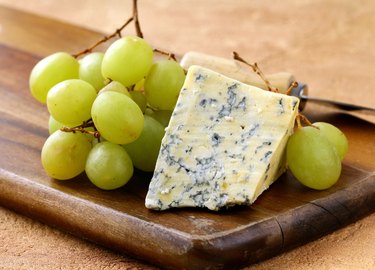
A stinky cheese isn't necessarily a sharp cheese, and a sharp cheese may have a mild, pleasing aroma. So pick up that wedge of cheese, give it a good whiff and if you pass out, it's a stinky cheese, however, if you squeeze a sharp cheese it's usually hard but carries no definitive aroma. There are several types of sharp cheese — that aren't stinky.
Video of the Day
The word "sharp" when used to define a cheese means it's aged longer and has a stronger flavor profile. There is no hard and fast rule to define a sharp cheese, but if it has aged at least six to nine months, it's considered sharp. Longer ageing usually denotes a cheese as extra sharp. The harder the cheese, the sharper and more flavor intense it is. Cheddar, provolone, asiago, Manchego and some cheeses with blue veins running through them are considered sharp.
Video of the Day
The Story Behind Sharp Cheddar
Cheddar cheese is not an American invention, but it is one of the most popular cheeses in America. Originally developed in Cheddar, Somerset County in the United Kingdom, its color ranges from white to blistering orange. That orange color comes from the additive of annatto, most likely to please the children who insist on cheese being a bright orange color rather than a pale white. Blame Kraft Macaroni and Cheese for that.
A sharp Irish cheddar is crumbly and grainy such as Kerrygold Aged Cheddar which has spent two years maturing. Super Sharp Quebec Cheddar has been aged for four years and the crème de la crème of cheddar, the Widmer's Reserve Cheddar has been aged 10 years. Cut the sharpness of the cheddar with a piece of fruit, by adding a slice to an apple or pear, and if grated, add it to fresh pasta or an omelet.
Not all sharp cheeses are hard cheeses. Some soft and runny cheeses are also considered sharp. The blue veins running through a wedge of Blue cheese actually are loaded with penicillin, also known as blue mold spores. A delicacy to many, blue cheese blends a soft creamy texture with the mold spores to create a sharp cheese.
Well-aged Brie and Camembert cheese go from mild to stinky and from creamy to sharp the longer they sit. Muenster is another that transitions from smooth to sharp the longer it ages. Sharp Swiss cheese falls into the same category.
Pairing Sharp Cheese With Wine
Select a wine that has intense fruit flavors when serving sharp cheese. A cabernet sauvignon that has aged several years and lost its tannin-forward taste is suggested. California cabernets are especially "jammy" and pair well with sharp cheese while French wines give a cleaner aftertaste. Port wine is another suggestion, especially if you are serving sharp cheese after a large dinner. The sweetness of the port contrasts with the sharp cheese. For non-wine drinkers, try serving hard cider or a strong ale.